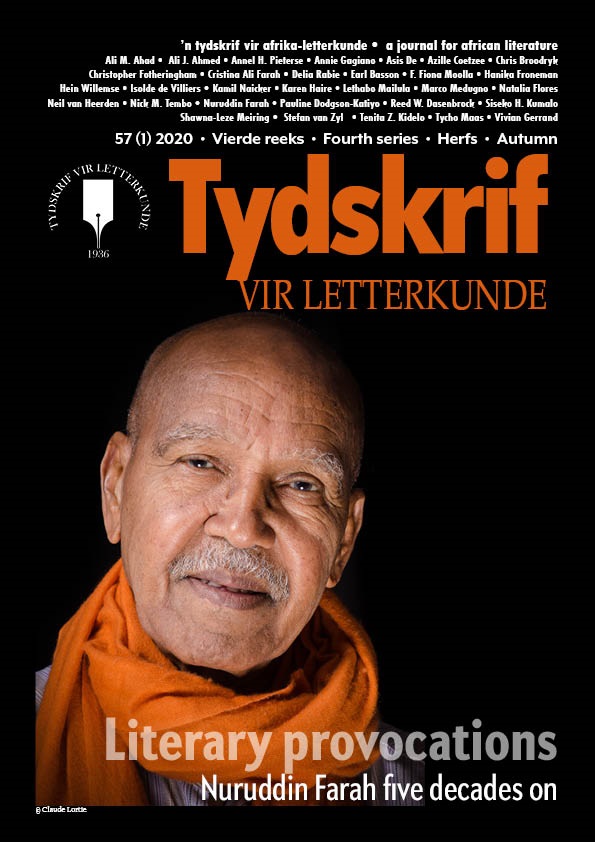Nuruddin Farah: Variations on the theme of return
DOI :
https://doi.org/10.17159/2309-9070/tvl.v.57i1.8078Mots-clés :
Nuruddin Farah, Somalia, exile, return, homelands, postcolonial literature, African literatureRésumé
This article explores the role of the returnee protagonist in selected works of Nuruddin Farah. Nadine Gordimer described Farah as “one of the real interpreters” of Africa and this article argues that Farah’s returnees operate as interpreters themselves, their liminality working to mediate between international readers and “local” subject matter. However, it also observes that Farah, who spent decades in exile, is often as preoccupied with writing non-belonging as he is with rendering Somalia itself. Farah’s returnee narratives are, broadly, novels of redress, in which characters enact their return in an attempt to seek out the missing, rebuild the lost or reclaim the stolen, with imperfect results. In exploring these variations on homecoming, the paper investigates the ways in which Farah’s body of work reflects shifts in identity politics over time, and the unique pressures these shifts exert on the homecoming arc.
Téléchargements
Références
Adorno, Theodor. Minima Moralia: Reflections on a Damaged Life. Trans. E. F. N Jephcott. Verso, 2005.
Boym, Svetlana. The Future of Nostalgia. Basic, 2001.
Carbonieri, Divanize. “‘Please Do Not Judge Us Too Harshly!’—The Exile’s Return to Contemporary Somalia in Links by Nuruddin Farah.” Acta Scientiarum: Language and Culture vol. 36, no. 1, 2014, pp. 83–91. DOI: https://doi.org/10.4025/actascilangcult.v36i1.19340.
Dodgson-Katiyo, Pauline. “The ‘Rubble’ & the ‘Secret Sorrows’: Returning to Somalia in Nuruddin Farah’s Links and Crossbones.” African Literature Today vol. 34, 2016, pp. 67–81. DOI: https://doi.org/10.1080/14725840600761195.
Farah, Nuruddin. “A Country in Exile.” World Literature Today vol. 72, no. 4, 1998, pp. 713–5.
Farah, Nuruddin. Crossbones. Granta, 2012.
Farah, Nuruddin. Knots. Riverhead, 2007.
Farah, Nuruddin. Links. Kwela, 2003.
Farah, Nuruddin. “Of Tamarind and Cosmopolitanism.” Witness Literature: Proceedings of the Nobel Centennial Symposium, edited by Horace Engdahl. World Scientific, 2002, pp. 69–77. DOI: https://doi.org/10.1142/9789812706515_0006.
Farah, Nuruddin. Yesterday, Tomorrow: Voices from the Somali Diaspora. Cassell, 2000.
Gagiano, Annie. “Surveying the Contours of ‘a Country in Exile’: Nuruddin Farah’s Somalia.” African Identities vol. 4, no. 2, 2006, pp. 251–68 DOI: https://doi.org/10.1080/14725840600761195.
Garuba, Harry. “Dreaming on Behalf of the Community: A Conversation with Nuruddin Farah.” Boundary 2 vol. 44, no. 2, 2017, pp. 1–13. DOI: https://doi.org/10.1215/01903659-3826600.
Garuba, Harry. “Teacherly Texts: Imagining Futures in Nuruddin Farah’s Past Imperfect Trilogy.” Boundary 2 vol. 44, no. 2, 2017, pp. 15–30. DOI: https://doi.org/10.1215/01903659-3826609.
Harper, Mary. Getting Somalia Wrong? Faith, War and Hope in a Shattered State. Zed, 2012.
Hobsbawm, Eric J. The Invention of Tradition. Cambridge U P, 2000. “Hypothesis”. Oxford Dictionaries. 2011. www.lexico.com/en/definition/hypothesis. Accessed 27 Apr. 2019.
Jaggi, Maya. “Nuruddin Farah: a Life in Writing.” The Guardian, 21 Sept. 2012, www.theguardian.com/culture/2012/sep/21/nuruddin-salah-life-in-writing.
Moolla, F. Fiona. Reading Nuruddin Farah: The Individual, the Novel & the Idea of Home. James Currey, 2014.
Naicker, Kamil. “Going to Pieces: Narrative Disintegration in Nuruddin Farah’s Crossbones.” Social Dynamics vol. 43, no. 1, 2017, pp. 8–18. DOI: https://doi.org/10.1080/02533952.2017.1341089.
Niemi, Minna. “Witnessing Contemporary Somalia from Abroad: An Interview with Nuruddin Farah.” Callaloo vol. 35, no. 2, 2012, pp. 330–40. DOI: https://doi.org/10.1080/02533952.2017.1341089.
Odeh, Tayseer Abu. “The Pleasures and Pitfalls of Exile and Counterpoint in Farah’s Maps.” Arab Studies Quarterly vol. 40, no. 2, 2018, pp. 134–54. DOI: https://doi.org/10.13169/arabstudquar.40.2.0134.
Phillips, Mike. “Blood in the Sand.” The Guardian. 16 Apr. 2005, www.theguardian.com/books/2005/apr/16/featuresreviews.guardianreview9.
Said, Edward W. Reflections on Exile and Other Literary and Cultural Essays. Granta, 2013.
Sarvas, Mark. “Crossbones.” The Barnes & Noble Review, 25 Oct. 2011, www.barnesandnoble.com/review/crossbones.
Sawhney, Hirsh. “A Novel of Pirates, Zealots and the Somalia Crisis.” The New York Times. 9 Sep. 2011. www.nytimes.com/2011/09/11/books/review/crossbones-by-nuruddin-farah-book-review.html.
Téléchargements
Publiée
Numéro
Rubrique
Licence
(c) Copyright Tydskrif vir Letterkunde 2020

Ce travail est disponible sous licence Creative Commons Attribution - Partage dans les Mêmes Conditions 4.0 International.


 https://orcid.org/0000-0001-6465-6584
https://orcid.org/0000-0001-6465-6584


.png)